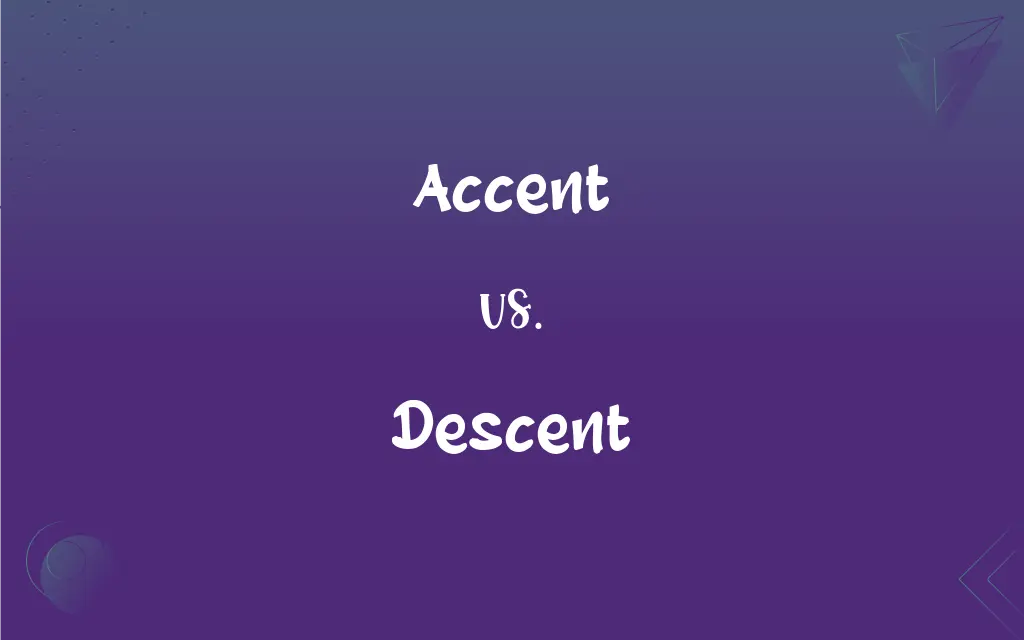Accent vs. Descent: What's the Difference?
Edited by Janet White || By Harlon Moss || Published on November 13, 2023
"Accent" refers to a particular way of pronouncing words, influenced by geographical region or social group, while "descent" refers to a person's lineage or ancestral origin. They are unrelated in meaning.

Key Differences
Accent pertains to speech, reflecting regional, national, or social variations in pronunciation. It marks the speaker’s linguistic identity. For example, "Her British accent was evident in her pronunciation," signifies the regional characteristics of speech.
Descent refers to the act of moving downwards, like in mountain climbing, or it indicates ancestry or lineage. For instance, "His descent from a line of artists was clear in his talent," refers to family lineage.
Accent is an auditory characteristic, evident when a person speaks. It can change over time and can be influenced by a person’s environment. For example, "After living abroad, his accent changed," highlights the adaptability of speech patterns.
Descent, when referring to ancestry, is a matter of heritage and lineage. It is a static attribute, unchanging regardless of a person’s experiences. For example, "Her descent from Greek ancestors was an important part of her identity."
Accent can also refer to stress or emphasis on a syllable in pronunciation or in terms of importance. For instance, "The accent in the word 'record' changes its meaning," illustrates the emphasis aspect.
ADVERTISEMENT
Descent, in a physical context, involves movement from a higher to a lower position. It's often used in contexts like aviation or hiking. For example, "The plane's descent was smooth," describes a downward trajectory.
Comparison Chart
Definition
Pronunciation style linked to region or class.
Movement downward or lineage and ancestry.
Context
Linguistic, speech-related.
Physical movement or heritage.
Changeability
Can change with environment or learning.
Static in terms of ancestry.
Usage in Speech
Describes how words are pronounced.
Not related to speech, except in metaphorical use.
ADVERTISEMENT
Additional Meanings
Stress on syllables; importance.
Not applicable to speech, mainly physical descent or lineage.
Accent and Descent Definitions
Accent
Emphasis on a particular syllable in a word.
The accent is on the second syllable in ‘computer’.
Descent
The act of moving downward.
The hiker carefully planned his descent from the mountain.
Accent
Distinctive pronunciation associated with a particular region.
His accent revealed he was from New York.
Descent
Ancestral lineage or heritage.
She took pride in her Italian descent.
Accent
A distinctive mode of expression.
Her writing had a lyrical accent to it.
Descent
A downward slope or decline.
The descent into the valley was steep.
Accent
A manner of articulation differing from standard speech.
His accent became more pronounced when he was excited.
Descent
A lowering or decline in quality or character.
The empire's descent into chaos was gradual.
Accent
Way of speaking characteristic of a social group.
Her accent changed after she joined the theater group.
Descent
Origin or background in terms of nationality.
His descent was a mix of French and Vietnamese.
Accent
The relative prominence of a particular syllable of a word by greater intensity or by variation or modulation of pitch or tone.
Descent
The act or an instance of descending
The slow descent of the scuba divers.
Accent
Vocal prominence or emphasis given to a particular syllable, word, or phrase.
Descent
A way down
Fashioned a descent with an ice axe.
FAQs
Is accent always tied to nationality?
Not always; accents can reflect regions, social groups, or even personal idiosyncrasies.
Does having an accent affect language comprehension?
It can, depending on the listener's familiarity with the accent.
Do all English speakers have an accent?
Yes, everyone has an accent that may reflect their region or background.
Can descent indicate a drop in moral standards?
Yes, it can metaphorically mean a decline in quality or morals.
Can someone have multiple descents?
Yes, individuals can have mixed heritage or national backgrounds.
Does descent always mean physical movement?
No, it can also refer to ancestry or decline in other aspects.
Can accents change over a person’s lifetime?
Yes, accents can change due to new environments or influences.
Is descent only related to family background?
Primarily, but it also refers to downward movement.
Is descent always from a higher altitude?
In a physical sense, yes, it involves moving from higher to lower.
Are accents inherited?
Not genetically, but they can be learned from one’s environment.
Can descent be traced through DNA tests?
Yes, DNA tests can provide information about one’s ancestral descent.
Can accents be a subject of linguistic study?
Absolutely, accents are an important part of sociolinguistics.
Does accent influence a person’s identity?
It can be a significant part of one’s cultural or regional identity.
Can descent be used in aeronautics?
Yes, it's often used to describe an aircraft's downward movement.
Is descent important in genealogy?
Yes, it's crucial in tracing family lineage and heritage.
Do accents affect social perceptions?
Yes, accents can influence how people are perceived socially or professionally.
Is an accent a sign of poor language skills?
No, an accent simply reflects a person’s linguistic background.
Is descent used in sports?
Yes, especially in sports involving elevation changes like skiing.
Does descent imply a return to an origin?
In some contexts, it can imply a return to a starting point or origin.
Can someone lose their accent?
Accents can change or diminish, especially if one is immersed in a different linguistic environment.
About Author
Written by
Harlon MossHarlon is a seasoned quality moderator and accomplished content writer for Difference Wiki. An alumnus of the prestigious University of California, he earned his degree in Computer Science. Leveraging his academic background, Harlon brings a meticulous and informed perspective to his work, ensuring content accuracy and excellence.
Edited by
Janet WhiteJanet White has been an esteemed writer and blogger for Difference Wiki. Holding a Master's degree in Science and Medical Journalism from the prestigious Boston University, she has consistently demonstrated her expertise and passion for her field. When she's not immersed in her work, Janet relishes her time exercising, delving into a good book, and cherishing moments with friends and family.








































































